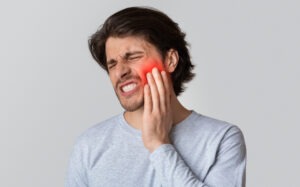
Tooth discomfort can be an uncomfortable and distressing experience that can make even the simplest activities, like eating and drinking, unbearable. Different types of tooth pain come with their own unique sets of causes and treatments. Thankfully, a trip to the dentist can help you get to the bottom of what is happening and how to fix it. Here are common types of tooth pain and what you can do about them:
Sensitivity
Tooth sensitivity is one of the most common types of tooth pain occurring due to exposed nerve endings. The sensation is usually sharp, sudden and uncomfortable and happens when the tooth comes in contact with hot or cold temperatures, acidic food and drinks, or even cold air. You may also feel sensitivity when brushing or flossing your teeth. This can be caused by:
- Tooth decay
- Gum disease
- Cracked or chipped teeth
- Teeth grinding
- Using harsh toothpaste or mouthwash
- Brushing too hard
If you experience tooth sensitivity, speak to your dentist. A common treatment for this type of pain is desensitizing toothpaste, which contains ingredients to protect nerve endings. Something as simple as using a soft-bristled brush, avoiding acidic foods and drinks, and practicing good oral hygiene can also make a difference.
Sharp Pain
This is usually a sudden, intense, short-lived pain that feels like a stabbing or piercing sensation. Some causes may include the following:
- Tooth decay
- Cavities
- Gum disease
- Trauma to the tooth
It’s important to seek dental care as soon as possible, as sharp pain may indicate that tooth damage has progressed to the inner layers, leading to infection and other complications. In the meantime, you can take over-the-counter pain medications like ibuprofen and apply a cold compress to the affected area.
Throbbing Pain
Throbbing tooth pain is a persistent, pulsating, stabbing pain that can be accompanied by swelling, redness, and sensitivity. It may worsen when lying down or bending over and can be caused by:
- Tooth decay
- Gum disease
- Abscess (pus buildup due to bacterial infection)
- Tooth fractures
Treatments vary based on the cause and may include deep cleaning, antibiotics, or a root canal procedure. Visit your dentist as soon as possible for proper diagnosis and treatment.
Pain Near the Back of the Mouth
Posterior tooth pain, or pain at the back of the mouth, can feel dull, sharp, or throbbing and is usually located in the molars (back teeth) or wisdom teeth. This experience can occur for reasons similar to the ones above: tooth decay, gum disease, or infection. However, pain near the back of the mouth may also indicate problems with your wisdom teeth.
In any event, visit your dentist so they can identify the underlying cause of your problem. If the pain comes from your wisdom teeth, they may recommend extracting these to avoid further complications.
Pain When Chewing
If you experience tooth pain while chewing, this can be caused by gum disease, cracked teeth, tooth decay, infection, or even improper bite alignment. In some cases, the discomfort may result from temporomandibular joint disorder (TMD).
As with other types of tooth pain, book an appointment with your dentist so they can assess the issue and provide treatment to alleviate the pain. For example:
- If you have a chipped tooth, your dentist may recommend a filling or dental crown.
- If you have TMD, you may need a combination of therapies.
To alleviate the pain at home, try to avoid eating hard or chewy foods, as this can exacerbate the issue.
Visit Yazdani Family Dentistry
Tooth pain is common but can be a distressing experience — we get it! At Yazdani Family Dentistry, we’ll assess your concern and recommend the appropriate treatments so you can continue to maintain your healthy, beautiful smile. Book your appointment today.









